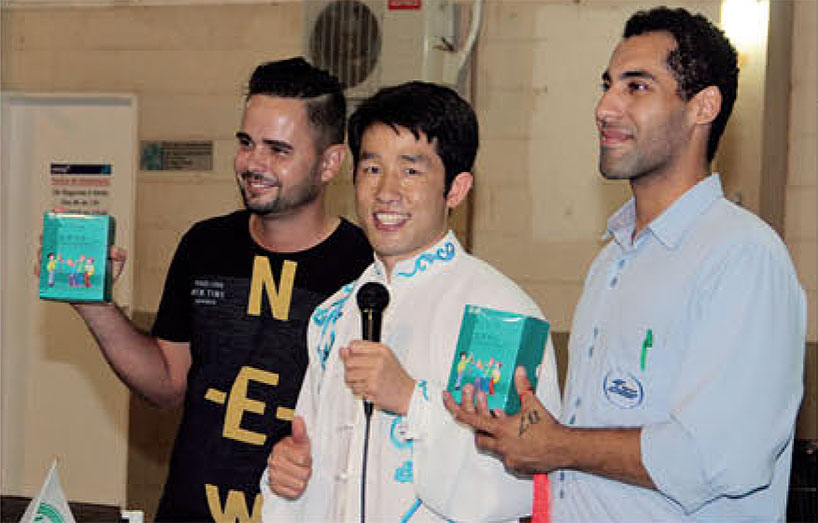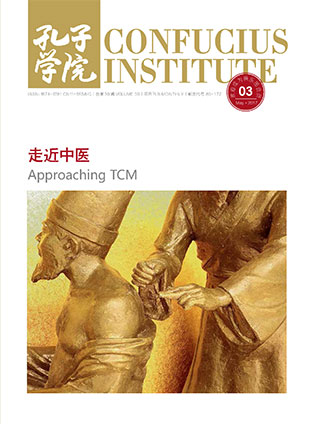
Guo Jianhui: “The unconventional path I chose”
Guo Jianhui: “When I first started teaching I could barely speak a word of Portuguese, so I mostly relied on my broken Portuguese and lots of gestures. When the first class came to an end I let out a sigh of relief, saying to myself, “Finally I had made it through!” As the saying goes, “The first step is always the hardest”, and I think this is really true”.
Currently there are over 4,000 Chinese language teachers and volunteers teaching Chinese in Confucius Institutes, primary and secondary schools and universities throughout the world. While spreading Chinese language and culture, these cultural envoys personally experienced exchanges and interactions with different teaching practices and other cultures. The column of Teachers’ Voices is a channel where Chinese language teachers and volunteers can share their teaching experience with each other. There will also be a collection of stories on their unique experiences in foreign lands these cultural envoys can share with our readers.
by Guo Jianhui
I stayed in Ilha Solteira, a small town in Sao Paulo State, Brazil. The city of Sao Paulo is the fourth largest on Earth, regarded as the financial center of South America. But the little town where I stayed seemed to have nothing to do with this metropolis. The headquarters of the Confucius Institute at the University of Estadual Paulista , is located in the city limits. But among the teaching sites governed by the headquarters, the farthest from Sao Paulo, where I worked, takes a painstaking 20 hours to get to and back from, almost as much time as it would take for me to return to China.
When I first arrived there I had some difficulty adapting to the life, because I couldn’t speak the language, and didn’t have any experience in teaching Chinese. So I didn’t know how to prepare for my classes, or how to teach Chinese effectively. Faced with an unfamiliar environment I would often feel out of my element, as I had graduated as a physical education major, and lacked knowledge pertaining to Chinese language teaching. However, my main task at hand was teaching Chinese, not t’ai chi ch’uan or other martial arts, so I had nowhere to use my education background in athletics, while at the same time Chinese language education was not my major. So how could I put my skills to good use in this little town?
But I had to stick to the path I’d chosen regardless of how hard it was and I knew I’d make it through no matter what. I had no other choice but to grin and bear it. When I first started teaching I could barely speak a word of Portuguese, so I mostly relied on my broken Portuguese and lots of gestures. When the first class came to an end I let out a sigh of relief, saying to myself, “Finally I had made it through!” As the saying goes, “The first step is always the hardest”, and I think this is really true.

There were no Chinese people there, much fewer Chinese stores. On weekends I’d usually go work out at the gym, and sometimes I’d play football and basketball with some of the locals. Once in a while some students, friends and I would have a barbecue, from which I unexpectedly learned how to do Brazilian-style barbecue. After making more Brazilian friends, my Portuguese improved quite a bit. I then spent more time on my teaching and my own improvement. Once I got better at teaching, I also got better at controlling the classroom, and my rapport with the students was strengthened substantially.
I remember that in the days I first arrived in Brazil, everything was new to me: the large groups of vagrants along the streets and slums which encircled the mountains, no stores open on weekends and even no people on the streets…All of these things really aroused my curiosity. But after having stayed in Brazil for almost a year and a half, my language skills reached a new level, and I gained a deeper understanding of the country.
Toward the end of the semester, when I told the students I was about to leave, they all expressed their reluctance to see me go, which filled me with a feeling of accomplishment. All of a sudden I felt reluctant to leave, realizing that these get-togethers with the students had become my home away from home. I think my connection with these students will be something lasting forever in both their and my memory.
Train stations are unusual places, filled with both joy and sorrow. When I said goodbye to Diego, Juliana, and all the adorable students and their parents, each of them gave me a big hug, and I was unable to hold back my tears that welled up in my eyes. At that moment I realized that how I loved them!
Published in Confucius Institute Magazine
Number 50. Volume III. May 2017.
Number 50. Volume III. May 2017.
























No hay comentarios:
Publicar un comentario